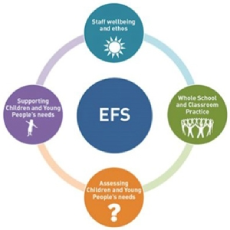SEND Parent Information
Frequently asked questions and information
SEND PARENT INFORMATION
At Marus Bridge Primary School, we believe that early identification is paramount in order to ensure that we are fully inclusive school.
How do school identify children/young people with special educational needs?
We range a range of tools in order to give us the ‘bigger picture’ such as:
Analysis of attainment data
Discussions with parents/carers
Discussions with Key Stage managers during pupil progress meetings
Discussions with the SENDCo
Observations of the child working in class
Observations and assessments from the schools Targeted Educational Support Service (TESS)
Observations and assessments from other outside agencies
How do teachers raise any concerns that they may have?
Informal discussion with SENDCo
Provide evidence of the WOAIP being used (QFT)
Pupil Progress Meetings (PPM)
Meetings with parents/carers
Discussions with leaders during audit meetings
Annual Planning, Development and Review meetings (TESS and Educational Psychologist are present)
Pastoral referrals
CPOMs (our school’s recording system)
What should I do if I think my child/young person may have special educational needs?
What are the processes for parents/carers raising any concerns with school?
We operate an open-door policy where by parents/ carers and visitors are welcomed into the school. The process for parents should be:
Make an appointment to discuss your concerns with the class teacher.
Bring any paper work that you may have with you to the meeting.
The class teacher will advise on next steps and you can discuss what actions will take place.
If you are not happy with the outcome after speaking to the class teacher, you may make an appointment to speak with Georgia Evans (SENDCo) or Karen Bish (Pastoral Lead)
How will the school staff support my child/young person if they have SEND?
Who will oversee and plan the education programme and who will be working with my child/young person and how often?
The class teacher in liaison with the SENDCo and other professionals (Speech and Language, Targeted Educational Support (TESS), Educational Psychology Service (EP) etc.)
The Pastoral Lead alongside the class teacher and the other professionals
What will their roles be?
Class teacher in liaison with SENDCo (if necessary) will plan an individual education plan (IEP) for your child. This is a working document updated and discussed regularly with you as parents.
Leaders and the SENDCo will have discussions with the class teacher about what impact the education plan is having upon your child’s learning. This will take place in pupil progress meetings.
The IEP will be annotated, updated and amended accordingly, depending upon the impact the plan is having on your child’s progress.
The Pastoral Lead (if necessary) will plan pastoral intervention work suited for your child or a Social, Emotional & Mental Health Well-being Plan will be put in place as extra support.
Who will explain this to me?
The class teacher will be able to explain the processes in school.
How does the school know how effective its arrangements or provision for children and young people with SEND are?
The school knows how effective its provision is for SEND children because their progress is monitored. If something is working, we will continue with the support, likewise, if something isn’t working we will adapt and change it. We use the model ‘Assess, Plan, Do, Review’
How will the curriculum be matched to my child’s needs?
What are the school’s approaches to differentiation? How will that help my child/young person
Quality First teaching is paramount. Teachers ensure that the needs of all children are met by careful planning and differentiation of the curriculum. All learners’ needs are catered for through the WOAIP document.
See the schools Teaching and Learning policy on our website.
The Graduated Approach
My Child has a Special Educational Need or Disability (SEND) but does not have an Education Health and Care Plan (EHCP) - what support is available?
The graduated approach will be followed by all schools and underpins the approaches to inclusion across all settings. Primary schools liaise closely with high schools to ensure a successful transition and continuity of support for children. All aspects of SEND require schools to follow a process based on an assessment of need and intervention over time so that information and evidence can be gathered.
All learners will access inclusive teaching which takes into account individual learning needs. This is known as the universal offer. Most children’s needs will be met through the universal offer. The curriculum is adapted for all children regardless of a child having an identified SEND need.
Some learners need additional support which can be provided by the school using their own resources:
· Class provision
· Opportunities to overlearn
· Pre-teaching
· Adapted teaching including use of additional resources
· Intervention activities within the classroom environment and/or withdrawn as part of a small group/or 1-1 specific intervention
A few learners need further support and school will often seek advice and guidance from other support services. This is a process over time (time lengths are dependent upon the child’s specific need or the specialised support required) and involves the recommendations of a range of professionals alongside family views.
In a small minority of cases a child may have such severe and complex needs the school might need to request additional resources. This could result in the Local Authority initiating an EHC (Education, Health and Care) needs assessment.
In addition to the normal reporting arrangements what opportunities will there be for me to discuss my child’s progress with the staff?
Informal discussions after school – we have an open-door policy.
Notes via your child’s home/school diary
We will always welcome opportunities to discuss your child’s progress so if you would like an appointment, please don’t hesitate to contact your child’s class teacher.
Pupil Progress Reviews with the class teacher take place in every term.
If your child has an Education, Health Care Plan (EHCP) there will be an annual review where parents/carers and all agencies involved will be invited to attend.
Parents/carers IEP / See the Child meetings or phone calls (Termly)
Parents/carers consultations (Autumn and Spring term)
Written end of year reports (Summer term)
How and when will I be involved in planning my child’s education?
If your child has SEND, discussions with the class teacher at least termly.
Meetings with the Pastoral Lead (if necessary) to plan and discuss pastoral interventions or a Social, Emotional and Mental Health Well Being Plan.
Do you offer any parent training or learning events?
We have a half termly SEND Parent support group run by Miss Evans and Mrs Bish. These are open to all our parents with a child on the SEND register. At these meetings we discuss various needs and opportunities as well as answer any questions parents/family members may have. We also invite visiting speakers in that parents have requested to support, and we also offer training courses in school as well as directing to the family hub sessions.
Youth Connect 5
Parenting courses 1:1
What support will there be for my child’s overall needs and/or well-being?
What is the pastoral, medical and social support available in the school for children with SENDS?
Mrs Bish oversees the pastoral and social support for children in school. The level of support provided will be personalised based on your child's needs. (This could be counselling sessions, pastoral work in school, friendship group etc.)
Individual Heath Care Plans are created for children who need them and these are shared with staff and created in conjunction with parents/carers and healthcare providers. Any training which is required is completed by staff via medical professionals who come into school or we travel to complete the training.
My child may have dyslexia, what can you do?
Every child is entitled to Quality First Teaching. If a child is not making expected progress with reading, writing and spelling and is reading at a level one or more year behind their chronological age, support will be put in place following a graduated approach. At every stage of intervention, the ‘assess, plan, do review’ approach is followed as stated in the SEN Code of Practice. We will provide appropriate programmes and interventions. This includes timed group interventions, evidence based and designed to increase. If the chils’s difficulties continue to be severe and persistent the school’s SENCo can request support from external agencies.
Support from external agencies may include the following:
Advice regarding quality first teaching, delivering interventions and monitoring and evaluation of those interventions.
Modelling of techniques, teaching strategies or interventions.
Ensuring Dyslexia friendly approaches are used in all lessons, such a buff or coloured paper, overlays, screens with coloured backgrounds and extra time/support given in reading, writing activities.
Only an Educational Psychologist can formally diagnose dyslexia, if you wish to go down this route, however our school follows all the dyslexia friendly approaches in the handbook in all classes.
What is an Education Health and Care Plan and who can make a request for one?
An EHC plan is a legal document that describes a child or young person's special educational, health and social care needs. It explains the extra help that will be given to meet those needs and how that help will support the child or young person to achieve what they want to in their life. It will state the views, interests and aspirations (wishes) of the parents and child or young person, describe the child or young person’s special educational needs and any health and social care needs, specify the provision required to meet those needs above and beyond normal classroom adaptations/support, state how services will work together to meet the child or young person’s needs and support the achievement of the agreed outcomes that have been agreed together and the plan should have short, medium and long term outcomes.
A child or young person’s school or setting can make a request if they feel that all other provisions have been tried and yet the child needs more support.
A parent can also apply (parental application) if they feel their child needs one.
In making its decision about whether a child or young person needs an EHC needs assessment, the local authority must look at what support has already been provided and whether there has been any progress. If a school or setting makes the request, they will be able to provide evidence of support, attainment and rate of progress. (EHCPs are assessed based on need in real time, not in preparation for future education)
If you as a parent, or your young person, make a request, visit the Independent Panel for Special Education Advice (IPSEA) website which gives detailed advice on what you should do – www.ipsea.org.uk
An EHC needs assessment will not always lead to an EHC plan. The information gathered during an EHC needs assessment may indicate ways in which the school, college or other provider can meet the child or young person’s needs without an EHC plan. It is important to acknowledge that a diagnosis of a medical condition or a learning need does not automatically mean that a child meets the criteria for an EHC plan.
What specialist services and expertise are available at or accessed by the school and who decides when this support is offered?
How is the decision made about what type and how much support my child/young person will receive?
At Maus Bridge Primary School, all children are monitored closely. We believe that all children are entitled to learn and access all areas of the curriculum.
In the first instance, the class teacher will raise any concerns about a child who is having difficulties with the key stage manager (EYFS- Holly Miller, KS1 Paula Riley, LKS2 Nicola Capstick, UKS2 Claire Boffey) and/or Special Educational Needs and Disabilities Coordinator (SENDCo), Georgia Evans.
There will also be a discussion with parents/carers and details about how we can support their child further will be discussed. The agreed actions will be implemented and reviewed. If this support is not having an impact, in liaison with parents/carers the SENDCo will make a referral for specialist advice/support. This may take the form of a speech and language referral or Targeted Education Support Service (TESS) referral. As a school, we will continue to implement specialist recommendations and review the impact, keeping recommendations that are working and changing/adapting the recommendations that are not. During this process, parents/carers will be kept informed by the class teacher and/or SENDCo.
We follow the Graduated Response in line with Local Authority Guidelines.
https://www.wigan.gov.uk/Business/Professionals/SEND/HEFA/Chap-4.aspx
Does the school have any specialist expertise?
We have a Targeted Educational Support Services (TESS) teacher, who is allocated to school from the Local Authority to support school.
We have an Educational Psychologist (EP), Ms Rebecca Finney
Although TESS and EP are not on site, they are only a phone call or email away.
We also work closely with the local specialist SEND schools, who provide an outreach service in order to support schools.
Startwell Support
Health Services, School Nurse.
School CAMHs link
School Councillor
Who is TESS and when are they involved?
TESS are specialist, qualified and experienced teachers and educational practitioners who work with schools to support children and young people (aged 4-16) when learning progress, social, emotional or mental health are causing concern. We work with every school in the borough. They provide specialist advice to support progress - through consultation, observation, modelling good practice and, where appropriate, assessment. We also offer a bespoke one to one teaching service to schools that includes modelling and coaching. TESS is used when the school have used interventions and WOIAP strategies and still children are still having difficulties. Each child needs to be discussed and prioritised based on a needs assessment.
Do staff have any specialist qualifications?
The Special Educational Needs and Disabilities Coordinator (SENDCo), Miss Evans, has completed the mandatory National Award for SEND Coordinators.
Mrs Talyor and Mrs Burrows are Mental Health First Aiders
A number of staff are first aid trained (including all EYFS)
Mrs Hill has received the Trauma Informed Practice award
Mr Aldridge is the Senior Mental Health Lead
All staff trained in Epi-Pen delivery
Mrs Bish, Miss Evans, Mrs Burrows, Mrs Taylor are Emotionally Friendly Schools leads
School has annual training in different areas of SEND from the TESS team for all staff or specific groups depending on need.
What other services does the school access?
Targeted Educational Support Services (TESS)
Educational Psychology Service (EP)
Outreach
Speech and Language Therapy (SALT)
Sensory Support Services (SSET)
Occupational Therapy (OT)
Child and Adolescent Mental Health Service (CAMHS)
Startwell
Social Care
School Nurse
Audiology
Play & Fly (Play Therapy)
How will my child/young person be included in activities outside the classroom, including school trips?
Will my child be able to access all of the activities of the school and how will you assist them to do so?
The class teacher will conduct a risk assessment of the activity or school trip and will organise the necessary provision so that your child can be included where possible.
We may also seek specialist advice when necessary.
How will you involve parents/carers in planning activities and trips?
Discussions with the class teacher
How accessible is the school environment?
Is the building fully wheelchair accessible?
Yes, our building complies with building regulations to ensure disabled access, including a disabled toilet and shower room and lifts.
Are there accessible changing and toilet facilities?
Yes, they are situated close to the school’s main entrance and in our LKS2 medical room and UKS2 department.
How does the school communicate with parents/carers whose first language is not English?
Where we not able to communicate effectively, school would contact the Ethnic Minority Service (EMAS) and ask for a specialist translator to aid the communication between school and the parents/carer.
How will equipment and facilities to support children with SEND be secured?
Education, Health Care Plan (EHCP) funding from the authority.
SEND budget.
How will the school prepare and support my child/young person to join the school, transfer to a new school or the next stage of education and life?
What preparation will there be for both the school and my child before he or she joins the school?
Apply to Local Authority (LA)
LA to send application form to school (includes information about the child and parents/carers contact details)
Headteacher would ring parents/carers to invite them to visit the school.
See Admissions policy on our school’s website
Weekly tours of school. These are sometimes conducted 1:1 if needs require us to do so.
Meeting with the school SENCO to discuss any worries or concerns
How will my child be prepared to move on to the next stage in their education?
Transition visits to new classes
Transition booklets to share at home with parents over the summer break
Teacher and TA discussions between current and receiving teachers/TAs
Collaboration with High School (Y6 Class teacher and Head of Y7) SENDCO is present to discuss SEND needs
How are the school’s resources allocated and matched to children’s/young people’s special educational needs?
How is the school’s Special Educational Needs and Disabilities (SEND) budget allocated?
The SEND budget is part of the base budget and is allocated over teaching costs, support staff costs, staff training, resources and trips.
How are parents involved in the school? how can I be involved?
Coffee Mornings
Parent training sessions
Volunteering in school
Parent Governor roles
Regular meetings in school
Friends of the School Association
Who can I contact for further information?
Who would be my first point of contact if I want to discuss something about my child?
Your child’s class teacher. Either call school to make an appointment or write a note in your child’s home/school diary.
Who else has a role in my child’s education?
Georgia Evans (The school’s Special Educational Needs and Disabilities Coordinator) 01942 248129
Karen Bish (The school’s Well-being and Pastoral Manager) 01942 248129
Ross Aldridge (Headteacher) 01942 248129
What other support services are there who might help me and provide me with information and advice?
Wigan Local Authority www.wigan.gov.uk
Parent Partnership 01942 486131
Embrace 01942 233323 or www.embracewiganandleigh.org.uk
Startwell (multi-Agency Hub) 01942 828300
Social Care (multi-Agency Hub) 01942 828300
School Nurse 01942 483739
Child & Adolescent Mental Health Service (CAMHS) 01942 482411
Who can I talk to if I am worried?
The first port of call should always be your child’s class teacher. If the class teacher is unable to help, they will point you in the direction of someone who can










